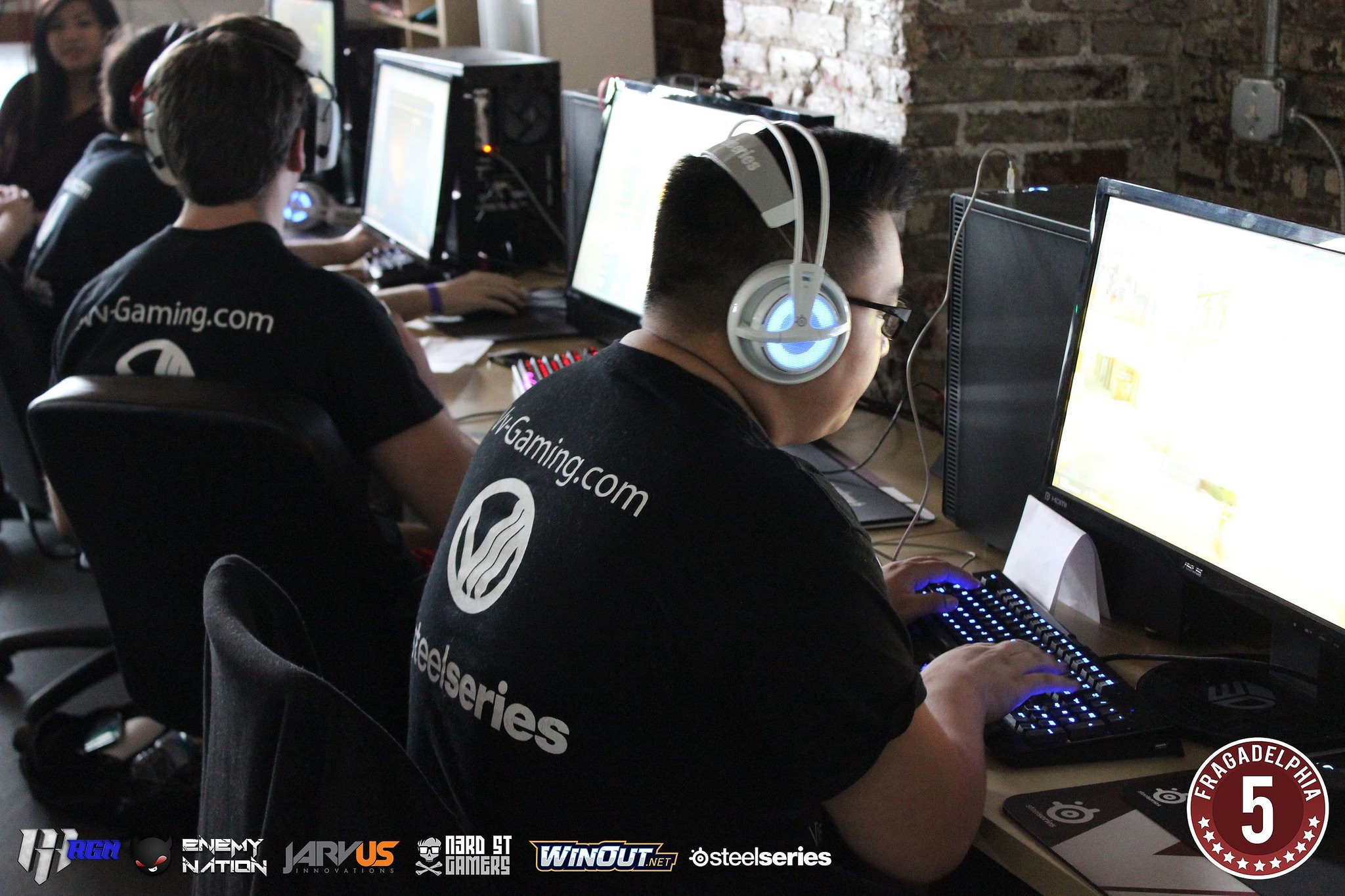The CLG Red team was supposed to lose. And they did.
So how come thousands of people were streaming online their match against another team, heavily favored to win, playing a video game? Well, because in eSports, like any other spectator competition, it’s really about the stories.
In the war of tech gender balance, gaming has become one of the most active battlegrounds. CLG Red, it turns out, is an all-female team, one of the best all-female teams in the world for playing Counter-Strike, a grandfather of first-person shooter video games. And, on Sunday, they faced Torqued, one of the best all-male teams in the world, a team made primarily of players that earlier this year were banned from playing major tournaments after a major cheating scandal.
Yeah, it made a pretty good story.
“We come in with the expectation that we’re better than everyone, so anything less than a win is a failure,” said Joshua Nissan, 25, who lives in Toronto. Throughout an interview, he came across as timid and muted on the topic of the ban, which is indefinite. “We fucked up, and we know it.”
“We’re here for the love of the game, and we’re hoping for a second chance,” said Keven Larivière, 24, of Montreal. This weekend’s tournament in Northern Liberties is likely the largest Counter-Strike competition that isn’t maintaining the ban.
"We fucked up. We're here for a second chance" @JoshNissan w/ @AZKcs are living a pro gaming ban at #fragadelphia pic.twitter.com/21ayGQ6ptf
— Technical.ly (@Technical_ly) October 19, 2015
Torqued won, fairly handily, bouncing the CLG Red team to the loser bracket of this weekend tournament. After the victory, Torqued continued on to eventually win the $7,000 top prize for the fall installment of Fragadelphia, a quarterly, open-call Counter-Strike tournament held at the Northern Liberties coworking space Devnuts that has become one of the most competitive of its kind in North America.
With grand hyperbole comes necessary explanation.
This weekend’s event is different than the so-called majors — large-scale, well-sponsored, invite-only competitions. Those are often organized in partnership with Valve, the gaming studio giant that publishes Counter-Strike, including its most recent edition, “Global Offensive” (lovingly called CS:GO by players). In contrast, Fragadelphia, which is open to any five-person team with $350, has clawed its way into being one of the world’s more serious CS:GO tournaments by a committed group of friends.
And people are watching. The CLG Red-Torqued battle’s viewership was only topped that weekend by the more than 16,000 who streamed CLG Red take on Team Karma, the tournament’s other all-female team, in a sponsored scrimmage. Try to say female gaming doesn’t have its own fan base.
Two founders of web dev firm Jarvus, which operates the Devnuts space, John Fazio and Chris Alfano met in 2005 at a former Neshaminy Mall LAN center, a public facility where gamers pay to play in game competitions. In 2014, the pair began their pursuit of a LAN center of their own, organizing events under the brand N3rd Street Gamers (you know, N3rd Street) with former pro player Steve Csikos and Brooklyn-based designer Rob Hilsky. This month, the four, with fellow Jarvus partner Kevin Clough, spun out N3rd Street Gamers as its own LLC, with plans of growing that business.
They’re already hosting a variety of video game tournaments (from throwbacks like Mortal Kombat to casual adult leagues like a forthcoming one for FIFA to a recent Starcraft II series) with more to come.
Gaming has “the power and framework to provide fundamental leadership and communication skills to our youth, in the way that youth sports programs currently do,” said cofounder Fazio. He’s betting they’re building a community that is ready for wider awareness and use.

Here’s the crowd at Fragadelphia 5 inside Devnuts. (Courtesy photo)
There’s considerable debate about whether online gaming is ready to join mainstream spectator sports. People have been streaming gaming for more than a decade, and if you talk to enough longtime players, there’s skepticism.
Ask Bruce Smith, 29, a former Counter-Strike player and Northeast Philly native who now lives in Portugal. He was at Fragadelphia to watch his brother and a friend compete, sitting on a black fold-out chair looking at a big screen streaming tens of players on computers just on the other side of a half wall.
Interest in “gaming is cyclical,” Smith said, wearing a thick red beard. “And Counter-Strike in particular hasn’t been able to really sustain a big industry. It’s fun, so there’s lots of hype, but I’m not so sure all this lasts.”
But since live video game streaming service Twitch was acquired by Amazon in 2014 for nearly $1 billion, there’s been revived sense that things are getting serious. Top championships for other games with more global appeal than a first-person shooter like Counter-Strike have had bigger online audiences than major sports finals, like the obscene 27 million viewers that watched a League of Legends championship stream.
“The culture of video games now permeates virtually all aspects of our culture and we intend to build a home for the video gamers who are more interested in playing together than alone in their homes,” said Fazio, noting a longterm goal of building a dedicated gaming venue.
Still it’s proving fertile ground for N3rd Street Gamers, which has already booked $250,000 in sponsorship revenue for 2016, according to Fazio, from partnerships with Azubu TV, Steel Series, Skin Arena and Tees4Gamers, among others.
That’s good because its the childhood dream of building their own physical hub of gaming that caused Fazio and Alfano to launch their company in the first place. And if eSports are to advance in prominence, it’s important that Philadelphia have its claim to the industry to bolster its broad tech community appeal. While places like Old City’s Philly Game Forge aim to grow the local supply side of gaming by training and connecting developers, the team behind N3rd Street Gamers is working to lead the demand side — building an international online viewership and attracting hundreds of gaming enthusiasts out to their events.
75+ playing and watching live this @N3rdStGamers Counterstrike tournament @Devnuts #fragadelphia (more on stream) pic.twitter.com/iMlN7FE2jh
— Technical.ly (@Technical_ly) October 18, 2015
It’s this crowd that was watching this weekend — from the first matches on Friday, to a full Saturday and the playoffs on Sunday. An average of more than 3,000 people were on the stream throughout the weekend, according to analytics provided by N3rd Street Gamers, including that 16,000 peak (the most the outfit has ever had) during the CLG-Torqued match.
Inside the high-ceilinged Devnuts facility on North 3rd Street, across from Liberty Lands Park, there were two announcers (players call them “casters”) commentating on the play for the web audience, a camera crew, an ever-evolving audience of 75 or more, mostly teenage boys, and more than two-dozen desktop computers with hardwire internet connections being used to play various matches.
Some in the audience traveled to watch, like Mike Guay, a 26-year-old government IT contractor and longtime gaming hobbyist who lives in Maryland and booked an Airbnb in Northern Liberties to see his roommate, one of the event’s announcers, do his thing and take it all in. It was his first live gaming event.
“I wanted to see how the CS community is after all these years,” he said.
Of the 28 teams, many were made of full-time professional players — two teams were all-female and just one other team had any female members. Though what that means is still evolving, most full-timers are contract employees of an organization backed by an array of sponsors — common brands include tech companies like Intel and gaming firms like iBUYPOWER, which sponsors both CLG and was backing the Torqued crew when they were banned.

CLG Red team members, left to right: Diane Tran, Stephanie Harvey, Captain Christine Chi, Catherine Leroux-Racette and Benita Novshadian. (Photo by Christopher Wink)
The sport attracts young players, like 19-year-old college dropout and South Jersey resident Shawn Taylor, who competed this weekend on a friend’s team. He can’t say how much he gets paid by the terms of his contract, but new players outside the very top tier can make less than $30,000 a year and, like minor league baseball players, few pro gamers are making real money.
“But my job is to play video games. That’s a dream. It’s my dream,” said Taylor. “Fragadelphia is one of the best tournaments to play with some of the best and build a name” to be able to make more.
And that’s because at this stage of the eSports industry, making a living in professional gaming is all about being a celebrity. There are at least four types of money flowing around this corner of gaming, excluding video game gambling, which is an entire topic of its own:
- Advertisers that want to see big online streaming totals from males 18-34
- Team and event sponsors that want to be associated with the world’s best known technologists
- Tournament prizes that include cash, swag and services
- Donations from fans who watch their favorite players online
Consider CLG Red team member Stephanie Harvey, 29, with glasses and the soft accent of a native French speaker. She lives in Montreal but plans to give up her game design job to move in with her teammates in Los Angeles to compete full-time. To get there, she’s balancing all four revenue streams. In an interview, she explained Fragadelphia was worth attending because the streaming totals are growing, it’s a chance to compete against top-flight talent to get closer to championship wins and it’s an event her fans and followers are becoming familiar with.
“Oh, and we can’t forget to mention the sponsors,” Harvey said to CLG team manager Jane Wie, who then rattled names from a list: Intel, Razer, DraftKings, iBUYPOWER, G2A, HyperX and DxRacer.
“I love competing. I love being the best. I love beating the bigger the goal. I love gaming,” said Harvey.
For CLG Red, the weekend was a success. They pulled in the weekend’s largest stream totals with the help of playing controversial Torqued, they fared fairly well against strong competition and were in the top-half of the 28 teams.
By contrast, anything less than the championship was a problem for the Torqued team. Nissan and Larivière and their teammates have been cut off from major competition. They’ve lost sponsors. Nissan is still playing full-time with the help of a supportive fan base — a $5,000 donation from a fan helped get the team to Fragadelphia — but Larivière is working part-time at a Hugo Boss retail store.
“We’ve played together for years, before any money came to CS or to gaming like this,” said Nissan. “Still, we’re hoping for something more.”
Before you go...
Please consider supporting Technical.ly to keep our independent journalism strong. Unlike most business-focused media outlets, we don’t have a paywall. Instead, we count on your personal and organizational support.
Join our growing Slack community
Join 5,000 tech professionals and entrepreneurs in our community Slack today!





